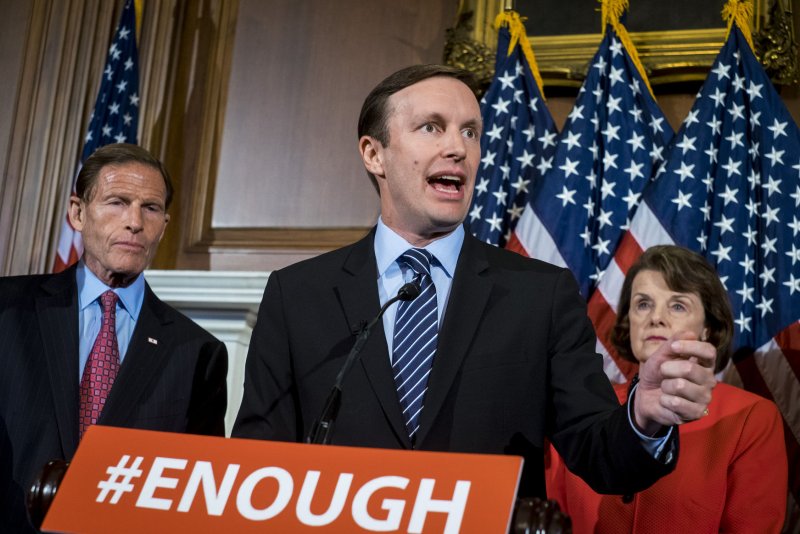1 of 5 | Sen. Chris Murphy, D-Conn., speaks during a press conference following a series of four procedural votes on the Senate floor on June 20, 2016 in Washington, D.C. The Senate failed to pass four gun control amendments to a Justice Department spending bill. Photo by Pete Marovich/UPI |
License Photo
WASHINGTON, June 20 (UPI) -- The U.S. Senate on Monday defeated new gun control proposals that have risen from one of the deadliest mass shootings in U.S. history.
Monday evening, the chamber voted down an amendment by Sen. Chuck Grassley, R-Iowa, to add funding to enhance existing background checks for gun purchasers. It came within seven votes of passing, 53-47.
Another Republican amendment from Texas Sen. John Cornyn, to require law enforcement to be alerted whenever a person who's been on the federal terror watch list in the past five years attempts to buy a weapon, also fell seven votes shy, 53-47. Under his proposal, Justice Department officials could block the sale for up to 72 hours while a court reviews the sale.
Democratic Connecticut Sen. Chris Murphy introduced a proposal to expand background checks and close a "gun show loophole" that lets people buy guns at trade shows without appearing on any federal registry. His didn't manage a simple majority with a vote of 44-56.
A second Democratic proposal from California Sen. Dianne Feinstein, proposing an amendment to allow the U.S. Justice Department deny a gun sale to anyone if there's a "reasonable belief" the buyer might engage in terrorism, fell 13 votes short at 47-53.
All four measures were attached to a Justice Department spending bill.
The new legislation was largely a reaction to the mass shooting in Orlando, Fla., that killed 49 and injured more than 50 others last week, but analysts say it also underscores the difficulty of getting any gun reforms passed by a largely pro-Second Amendment, Republican-controlled Congress.
All four measures were added to the spending bill after Murphy filibustered on the Senate floor last week for 15 straight hours. His aim was to keep talking until action is taken by the United States' lawmaking chambers.
The Republican amendments were blocked by Democrats who don't feel they do enough to control firearms, while the Democratic proposals were nixed by GOP voters who view them as unconstitutional.
Four different amendments proposed in the U.S. Senate Monday failed to reach the required number of votes to pass (60) and exemplified a stalemate in the upper chamber of Congress over reform and greater controls over firearms purchases by persons who might use them to commit violent crimes or terrorism. File Photo by Brian Kersey/UPI
The Second Amendment, which gives U.S. citizens the right to bear arms, is the primary obstacle in getting any gun reforms passed.
Sunday, National Rife Association CEO Wayne LaPierre said President Barack Obama's administration is using the Orlando shooting to distract attention away from the government's failures on terrorism.
After each recent mass shooting event, Obama has reiterated his desire for greater gun control -- including a ban on assault weapons, such as the popular AR-15, which is often the main weapon used in U.S. shooting attacks.
"What happened this past week is the president, the whole gun ban movement said look over here, divert your attention, take your eyes off the problem," LaPierre said Sunday during an appearance on on CBS' Face the Nation. "They don't want to face the embarrassment of their failure in this terrorist area, and they want to cover their butts and not talk about it."
The last Senate vote on gun legislation was in December following the San Bernardino, Calif., shooting in which 14 people were killed. Prior to that, gun legislation was introduced after the 2012 Sandy Hook massacre, where 20 children and six school staff members were killed in Connecticut. Neither of those measures survived a Senate vote.
Despite his amendment's defeat, Murphy expressed optimism Monday that the new actions might be the opening salvo to eventual change.
"This country is rising up to demand safer, stronger gun laws," he tweeted.
"I am disappointed in results of the votes tonight. But I know we will not stop fighting to end gun violence," he added.
"Support for this bill is broad. The Justice Department and the White House support it, and a Republican introduced the underlying measure in the House. It's time to enact this commonsense provision," Feinstein wrote in an op-ed in USA Today Monday.
















